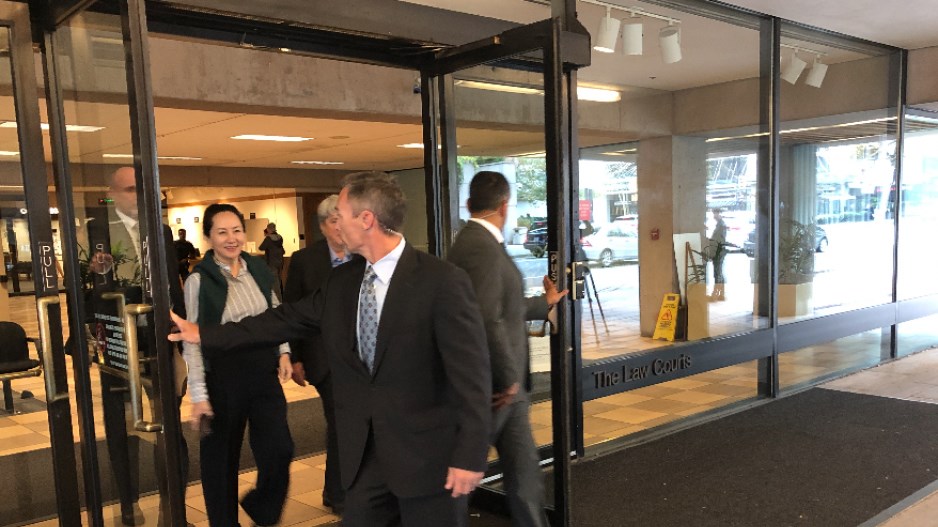The supervising RCMP officer who oversaw the arrest of Huawei Technologies Co. Ltd. CFO Meng Wanzhou may not have known about the provision for immediate arrest in the warrant issued for the Chinese executive until minutes before Meng’s arrival at YVR, the court heard this morning.
Under the cross-examination of defence lawyer Scott Fenton, RCMP Sergeant Janice Vander Graaf – who supervises the two officers serving the arrest warrant to Meng on Dec. 1, 2018 – said she may have been told about the provision before Meng’s arrest, but she did not know when exactly.
Vander Graaf also confirmed she did not read the actual arrest warrant until just before Meng’s plane arrived from Hong Kong. It means that two of the three RCMP officers involved in the arrest – Vander Graaf and RCMP Const. Gurvinder Dhaliwal – did not read the warrant until the moments leading up to the arrest.
“Would it shock you to learn that Officer Dhaliwal, in his testimony, said he did not read the arrest warrant until Dec. 4?” Fenton asked.
“No,” Vander Graaf said. “... Const. [Winston] Yep would have read it, and he may have told Dhaliwal.”
“I’m not interested in speculation,” Fenton fired back. “Is it the obligation of an officer to read the arrest warrant – the sole document from which you derive your authority to arrest Ms. Meng?”
“Yes,” Vander Graaf replied, adding that this is something that the RCMP may have to look at in terms of its operational procedures.
The question of whether or not the RCMP officers read the warrant comes down to the question of the provision of immediate arrest. Fenton alleged that – since the officer didn’t read the warrant – they may not have been aware of its existence, which resulted in Dhaliwal not taking the suggestion by a Canada Border Services Agency officer that the CBSA may step aside so Meng could be arrested on the plane as soon as it landed.
Instead, Meng was inspected by the CBSA for three hours, having her electronic devices and passwords taken without her charter rights being read. The devices and passwords were then passed on to the RCMP, a move that the defence said was a coordinated effort to acquire evidence to aid the U.S.’s fraud case against Meng (but argued by Crown counsel as part of a routine procedure of the CBSA having first jurisdiction in inspecting an incoming apssenger).
Vander Graaf said Dhaliwal did not tell her of the arrest-on-the-plane as an option, but added “it may not have changed anything” given her understanding that there were safety concerns for other passengers had they conducted the arrest on the plane.
In afternoon questioning, Fenton disputed those statements from Vander Graaf.
"It's my suggestion that you are making [passenger safety] a bigger deal then it ever was on the day of the arrest," Fenton said.
"That's not true," Vander Graaf replied.
"My suggestion is that you didn't arrest Ms. Meng on the jetway or the plane because you never took into consideration the requisite court order of immediate arrest," Fenton continued. "You didn't take it into consideration because you didn't read the arrest warrant until just before Ms. Meng's plane arrived."
Vander Graaf fired back on the passenger safety point, however, despite Meng having passed through Hong Kong airport security and presenting no previous violent criminal records.
"Arrests are unpredictable," the police officer said. "I've had people run. I've had people resist arrest and hurt themselves. There could be medical emergencies. And it's a tight space on the plane."
Fenton added that if it worried Vander Graaf that the CBSA ended up inspection Meng for almost three hours, to which the RCMP officer said no.
"So if the inspection took two days, and then afterwards she was released into RCMP custody and arrested, you would still consider that an immediate arrest?" Fenton asked.
"It could be," Vander Graaf replied.
Fenton also asked if Vander Graaf remember requesting CBSA officers to avoid bringing up the arrest warrant waiting for her once she got out of border admissibility exams - in order to avoid triggering Meng invoking her legal right to counsel immediately.
"We didn't tell the CBSA what to cover [in their questions] and what not to cover," Vander Graaf replied. "I didn't."
Under the questioning of Crown counsel John Gibb-Carsley, Vander Graaf also confirmed she did leave a message for a U.S. Federal Bureau of Investigation legal attache about the status of Meng’s arrest process, but the message was brief and basic, only stating that the arrest warrant has been served. No details about the contents and findings of the search were shared, Vander Graaf noted.
She also told the court that she told Dhaliwal to hang on to Meng’s device passcodes – collected by CBSA agent Scott Kirkland and mistakenly passed on to the RCMP, according to Crown counsel.
“You can’t unseize something,” Vander Graaf said. “Once you have it, you have it. So I just told him to document how you got the devices for transparency; you have to be able to explain how you got them.”
“Do you have any concerns about the conducts of your officers on that day?” Gibb-Carsely asked.
“No,” Vander Graaf replied.
The hearing continues on Thursday.




